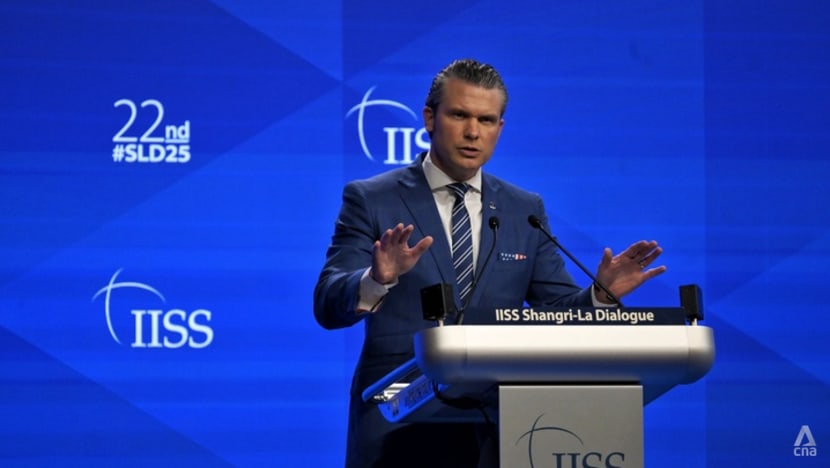China slams Hegseth speech, accuses US of seeking to use Taiwan issue as 'leverage' against Beijing

US Defense Secretary Pete Hegseth speaking during the first plenary session at the IISS Shangri-La Dialogue on May 31, 2025. (Photo: CNA/Wallace Woon)

This audio is generated by an AI tool.
SINGAPORE: China warned the United States against using Taiwan as "leverage" against Beijing, responding to remarks by US Defense Secretary Pete Hegseth at the Shangri-La Dialogue.
"The US should never imagine it could use the Taiwan question as leverage against China," said a Chinese Foreign Ministry spokesperson in a statement issued early on Sunday morning (Jun 1). "The US must never play with fire on this question."
The statement was a direct response to Hegseth's speech delivered on Saturday morning at Asia's premier defence summit in Singapore, in which he warned that China was "credibly preparing" to use military force and urged regional allies to increase defence spending.
"The threat China poses is real, and it could be imminent," said Hegseth, who also criticised its actions in the Taiwan Strait and South China Sea.
China, in turn, accused the US of escalating tensions and undermining peace in the region.
"No country in the world deserves to be called a hegemonic power other than the US itself," the foreign ministry said, pointing to American deployments in the South China Sea and its Indo-Pacific strategy as destabilising moves that have turned the region into a "powder keg".
It also reiterated that the Taiwan issue is purely China's internal affair, calling on Washington to cease support for "Taiwan independence" forces and fully adhere to the One-China principle and the three China-US joint communiques.
Hegseth's address marked his first appearance at the Shangri-La Dialogue as defence secretary under the Donald Trump administration.
He warned that any attempt by Beijing to seize Taiwan would have "devastating consequences for the Indo-Pacific and the world", echoing President Donald Trump's assertion that China would not invade Taiwan "on his watch".
In a separate panel on Saturday afternoon, China's representative, Rear Admiral Hu Gangfeng, rejected what he described as "groundless accusations" made by other speakers at the forum, calling them "politically motivated" and aimed at provoking conflict.
Hu, leading a delegation from the PLA's National Defense University, criticised foreign military deployments near China's waters and reiterated Beijing's opposition to "unilateralism" and "hegemonic bullying".
The foreign ministry's statement struck a similar tone, describing Hegseth's speech as filled with "provocations" and warning that Washington's actions are "deliberately destroying the peaceful and stable environment cherished by the region".
On the South China Sea, China said there was "no problem" with freedom of navigation and accused the US of being the true disruptor. "China has always been committed to dialogue and consultation," the statement said, while asserting its sovereignty over contested maritime areas.
China did not send Defence Minister Dong Jun to this year's forum, the first time since 2019 that Beijing will not be represented by its defence chief.
The Shangri-La Dialogue ends on Sunday.
"GROUNDLESS ACCUSATIONS"
On Sunday, China reaffirmed its sovereignty over the South China Sea in response to "groundless accusations" made during the Shangri-La Dialogue.
In a series of Facebook posts, the Chinese Embassy in Singapore said that the Philippines' Secretary of National Defense Gilberto Teodoro Jr, among others, had "made groundless accusations against China and distorted China's position on the South China Sea issue, so as to smear China's reputation".
Teodoro, in an interview on the sidelines of the summit on Saturday, spoke of the frustration of dealing with Chinese military counterparts who rarely stray from talking points and propaganda and represent an institution that exists to serve the Communist Party leadership.
"I believe my foreign affairs colleagues are trying their level best to engage China. But on the defence side, what we have seen is that China has to overcome a deficit of trust and credibility," he had said.
The embassy said on Sunday that there was "a full historical and legal basis for China to uphold territorial sovereignty and maritime rights and interests in the South China Sea", citing activities of the Chinese people in the region dating to over 2,000 years ago.
It added that "China has been exercising a high degree of restraint" with regard to the disputes in the waters.
"Some outside power claiming to 'safeguard the freedom of navigation in the South China Sea' in fact poses the biggest threat to a peaceful South China Sea, where it deploys offensive weapons, ropes in allies for frequent military drills, conducts close-in reconnaissance on Chinese islands and reefs, and profits from creating risks of war," the embassy said, without naming a specific country.
It added that China will defend its rights against "deliberate infringements" of maritime laws and "unwarranted provocation", warning that a conflict-based approach "is against the trend of the times, and will definitely not serve one’s own interests".
The embassy also said that "maintaining peace, stability and security" in the region "is in the interest of all parties".
"Despite the turbulence in the world, peace and stability in the South China Sea have been maintained thanks to the collective efforts of China and ASEAN countries," it said.
"Certain countries outside the region interfere (in) the South China Sea issue purely out of ulterior motives, which only add trouble, not peace and stability, to the South China Sea."
Earlier this month, China's foreign ministry urged the Philippines to stop provocations in the South China Sea, and its officials have frequently accused the US of sowing discord in the region.
China claims almost the entire South China Sea, despite overlapping claims by Brunei, Indonesia, Malaysia, the Philippines, Vietnam and Taiwan.
A 2016 ruling of an international arbitral tribunal said Beijing's claims, based on its historic maps, have no basis under international law, a decision China does not recognise.















